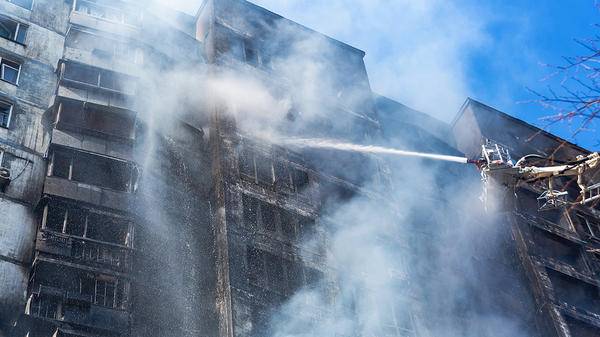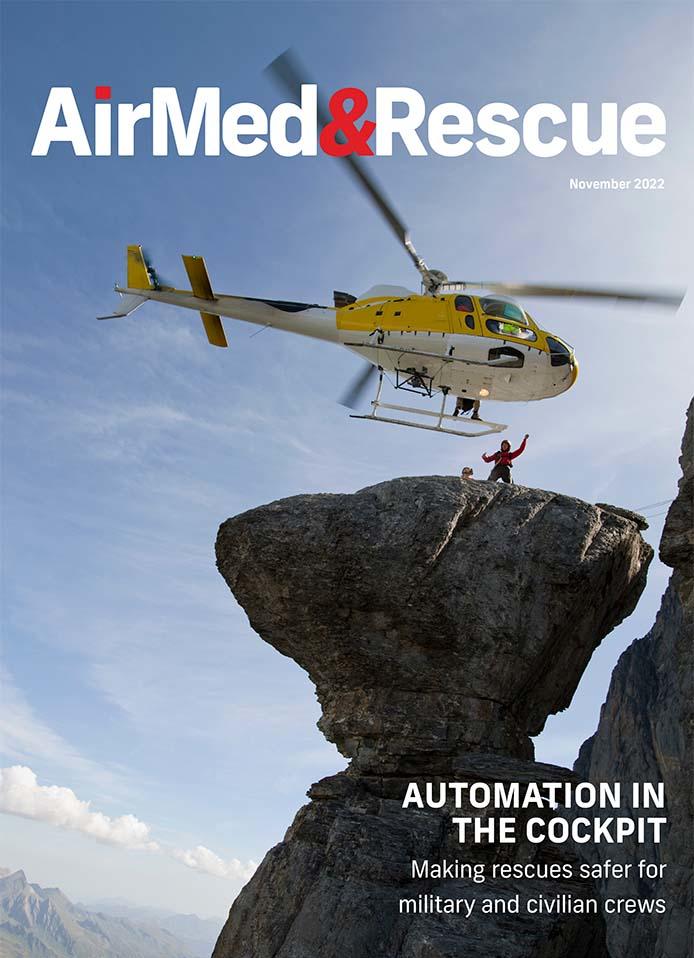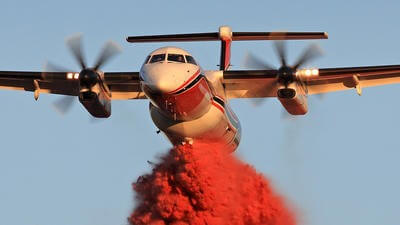Collaboration in action: How the UK Fire and Rescue Service has helped Ukraine

Kate McLaughlin reports from the Emergency Services Show, where panelists discussed how the Fire and Rescue Service in the UK has responded to the war in the Ukraine
With conflict in the Ukraine ongoing, AirMed&Rescue listened to representatives from the National Fire Chiefs Council (NFCC), manufacturing and industry, and the charity Fire Aid talk about their continued efforts to provide appliances and equipment to firefighters in the region.
Rob MacDougall, Director of Community Safety and Chief Fire Officer, Oxfordshire County Council
Rob has responsibilities for Fire and Rescue, Regulatory Services and Emergency Planning. He joined Oxfordshire in 1998, becoming the Chief Fire Officer in 2019. Rob supports the NFCC Strategic Procurement Hub as the Category sponsor for ICT, chairs the End Point Assessment Partnership between Cornwall Fire Rescue Service (FRS) and the National Fire Chiefs Council (NFCC), and is the NFCC representative on the Fire Aid Steering Group.
Rob is clearly passionate about how the UK can support colleagues in developing nations, using his experience working with the Ghana National Fire Service. “The charity Fire Aid has brought everyone together to be the umbrella organization which ensures that we're coordinating our efforts to support those countries. About 18 months ago, I took on the role of supporting Fire Aid from an NFCC perspective. One of our biggest challenges is trying to get the UK Fire and Rescue Service to work together to understand how they can help global projects. A success of Fire Aid has been to create a database, as the UK Fire and Rescue Service has equipment that is going out of commission, but still has useful life – it can be used across these projects.”
A wealth of experience prior to the Ukrainian conflict meant the UK Fire Service understood how to coordinate any help for the Ukraine. Rob concluded his talk by stating a ‘key element’ of this partnership was the UK government’s desire to step in and pull together a strategy, under Fire Aid, to offer the best support to the Ukrainian people.
Sarah Adamson, Industry Coordinator, Fire Industry Association and Angloco
Sarah is a consultant across the fire and rescue sector, currently working with Angloco, Department for International Trade, and the Fire Industry Association. Her varied portfolio started within Hampshire Fire and Rescue Service, before moving on to other large corporates and starting her consultancy company in 2013.
Sarah regaled the audience with how they ended up ‘delivering the biggest humanitarian aid package in history, being part of the finest examples of a collaborative team, with organizations who naturally don't really work that well together’.
“A couple of years ago, the Fire Industry Association – the largest Fire Protection Association in Europe – chose Fire Aid as their nominated charity. Angloco Managing Director, Alistair Brown, decided that we could probably do a little bit more than sponsoring a few events and shaking buckets at posh dinners. By donating fire engines, we’re helping a British manufactured product find its way to new places. At the same time, it's important to ensure that the donation was the best reflection of what we could make in the UK. Once you start to like using a certain piece of equipment or kit, that tends to be how you build out and inform buying decisions in the future. So, if we donate well, it’s likely going to be good for the UK economy also.”
Detailing sobering statistics from the conflict, Sarah shared how the respective parties from industry, charity and government pulled together via a virtual meeting to ensure aid would reach those who needed it most. “The team quickly agreed to include some other key partners, like the Cabinet Office and Border Force. And for three months, we worked daily to support each other, delivering that shared goal.

Against a challenging financial backdrop, we can collaborate to help the firefighters of the Ukraine. And I feel we’re going to deliver this because it’s just the right thing to do
“The team experienced many challenges along the way – and perhaps the most memorable was the port blockade. I can honestly say that was one of the most stressful points of my life. But we learned such a lot. Not only about each other's organizations, but also how to ask the same question many times, until they gave us the answer we were looking for.
“It really was a collaborative effort. Every team member had the might of their respective organizations at their back. We identified not only our strengths, but our weaknesses too. Luckily, we had that united common goal. It was really important to all of us that we tried our hardest – and we did.”
Heading in to delivering the fourth convoy, Sarah reflected: “It's been our responsibility to create an environment where, once again, against a challenging financial backdrop, we can collaborate to help the firefighters of the Ukraine. And I feel we’re going to deliver this because it’s just the right thing to do.”
Mike Pitney, UK to Ukraine Convoy Lead
Mike is a founding member of Fire Aid, a humanitarian charity that provides ethical and sustainable donations of fire and rescue equipment and training. The fact Mike had previously worked on projects in Ukraine for 10 years made him the ideal driver lead on the three largest Fire Service convoys to leave the UK. He is now actively looking for further support, equipment and funding to continue this life-saving work.
As a rule, Mike modestly states that he ‘gets to use a radio 500 times a day to communicate with an average of 23 vehicles, 70 drivers over three convoys, each four days long, covering 1,100 miles’. This is no mean feat, and his travels produce memorable tales: from fluke convoy breakdowns, meeting Jeremy Clarkson’s PA, to trauma teddy bears which the firefighters load up for the Ukraine, with each hub ending up with a teddy mascot.
Mike shared two important aspects for the audience to take away: professionalism and humanity.
“We have the NFCC and UK Fire Service. We are going to do a professional, efficient delivery (to the hubs); and we have an industry that collaborates.
“What I’ve come here to do is talk about the convoy and tell you about the humanity side of it. What is the best of the UK Fire Service nationally, but also firefighters the world over? The humanity – they sign up in their hundreds to go and do this. Despite the fact it's a new and unknown request and anyone who's in the fire service is used to routine, doing the same thing every day. Well, this is all brand new. They face challenges with happiness and humor. Then, when they come back, instead of that being the job done, they're raising money. They're staying on chat groups, wanting to do more.
“Let’s look at the humanity of Ukraine firefighters and people. For example, they collect the appliances from Poland to go into a war-torn country. They actually volunteer, because by going into Poland, they can buy cheap things at the shop to take back to a country where they can't buy anything. Also, Ukrainian refugees crying when they realize what we are doing, and that happens almost anywhere, any stop you make.”
A sobering reminder of why the aid provided is so desperately needed. Mike summed up by reminding the audience that, as time passes, we need to still remember the needs of the Ukrainian people.
Each bomb that takes out their neighbor's house, destroys someone’s home, kills friends and family – each time is day one of disaster for these people
“Finally, but importantly, as we all get used to the Ukraine invasion, with Prime Ministers changing, fuel prices rocketing and the Queen passing, it's easy to forget this war moving around the country. Each bomb that takes out their neighbor's house, destroys someone’s home, kills friends and family – each time is day one of disaster for these people. This is the first time the Ukrainian Fire Service goes to this new emergency. And this is what we are providing. Help towards that person’s direct involvement in a disaster. Every day, the equipment we have sent does this, and therefore we must continue to help. We may get used to the war going on, but we must never get used to the fact that people need saving, and we are an instrumental part of that.”
What the future holds
This evocative discussion was closed with final thoughts surrounding attitudes amongst suppliers. Sarah Adamson responded:
“As the supply chain, we have all been thinking about what we do with equipment as it approaches end of life. And it has been a conundrum, because it was the brand of the manufacturer, and you can only control that first sale. So, by us working more closely with organizations able to move that equipment on, we're able to ensure that it's revitalized.
“I think there's loads more we can do. There’s more that procurement teams can do when engaging with their supply chain for that first purchase. And consider how to move on vehicles and equipment beyond its usable life. There’s a real willingness from industry to make available anything that could be used. I also believe that UK manufacturing is really strong – we need to make equipment that outlasts its life in the UK. There’s also the aspect of repairing equipment. We're happy to ensure that things are going (for their second life) out better than they would otherwise. So, we are keen to do more of this kind of thing – and not just for the Ukraine. We need to think more broadly about how all equipment is sold.”
There is no fanfare for the volunteers once they finish the long journey to the drop points with these vehicles, or the Ukrainian firefighters. It’s business as usual, returning to their country to continue the fight. It is grueling for both parties for different reasons, and without the German and Polish firefighters supporting the UK endeavor, the task would be so much more difficult.
The supply of older appliances in the Ukraine and other countries can make more of a difference than we can ever imagine.

November 2022
Issue
Cockpit automation heightens safety, the move by air medical providers to longer-range jets, the standardization of infectious disease patient transfers, and electronic communication in the Mediterranean Sea helping to aid refugee rescues
Kate McLaughlin
Kate McLaughlin is Senior Editor at Voyageur Publishing, and Editor of AirMed&Rescue

